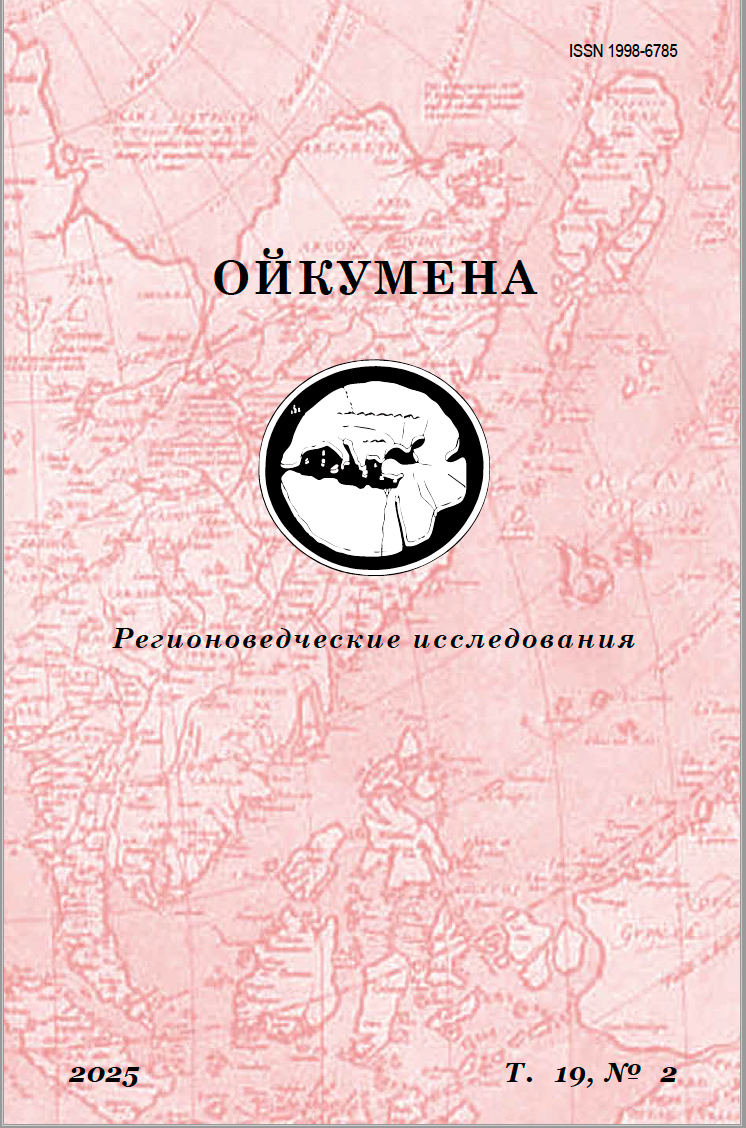graduate student
Moscow, Moscow, Russian Federation
Regionalization is a traditional method and "landmark" of Russian geography. However, political regionalization is not as common as socio-geographical, economic, and ecological. This article proposes a new methodology based on the analysis of South Korea electoral landscape. South Korean electoral geography is a good example can be used for this type of research, as the regional factor plays a significant role there. A grid of macro- and meso-regions is presented. The article also emphasizes the connections between regionalism and regionalization.
electoral geography, electoral regions, regionalization, Republic of Korea, regionalism
1. Axenov K. The Political and Geographical Foundations of the Functioning of the US Political System. Diss. L., 1989. 204 p. (In Russ.).
2. Andronova L. Formation and Evolution of Regional Identity in the Republic of Korea // Problems of Identity and Social Adaptation in History and Modernity. Tomsk, 2015. P. 84–92. (In Russ.). DOI: https://doi.org/10.17223/9785751123666/7; EDN: https://elibrary.ru/VUPGCP
3. Belov A. Political Geography of Canada: Regionalism in Political Life and Political Culture. Diss. Leningrad, 1983. 194 p. (In Russ.).
4. Zimoha A. Comparative Analysis of Patterns of Electoral Geography in Countries of Different Types. Diss. Moscow, 2006. 178 p. (In Russ.). EDN: https://elibrary.ru/NNSHZN
5. Kolosov V. Problems of Italy's Political Geography: Based on the Parliamentary Elections of 1953–1976. Diss. Moscow, 1979. 277 p. (In Russ.).
6. Petrov N., Titkov A. The Electoral Landscape of Russia and the 2003 Elections to the State Duma: Time-Space Analysis of Electoral Dynamics // Proceedings of the Russian Academy of Sciences. Geographic series. 2004. No. 3. P. 18–31. (In Russ.). EDN: https://elibrary.ru/OVYJJR
7. Socio-Economic Geography: Concepts and Terms. Dictionary / A. Gorkin (ed.). Smolensk: Ojkumena, 2013. 328 p. (In Russ.).
8. Chernetskii F. Approaches to Electoral Regionalization in the Russian Science (Based on Dissertation Researches) // A. Naumov (ed.) // Issues of Economic and Political Geography of Foreign Countries. Vol. 22. Faculty of Geography LMSU, Moscow, 2025. P. 172–189. (In Russ.). EDN: https://elibrary.ru/DEQGYA
9. Chernetskii F. Regionalism as a Key Factor in Electoral Processes in the Republic of Korea // Russian Koreanology Herald. 2022. No. 13. P. 67–81. (In Russ.).
10. Cho K. Regionalism in Korean Elections and Democratization: An Empirical Analysis // Asian Perspective. 1998. Vol. 22. No. 1. P. 135–156. DOI: https://doi.org/10.1353/apr.1998.a921111
11. Elazar D. American Federalism: A View from the States. NY: Thomas Y. Crowell Company, 1966. 228 p.
12. Kang W., Bae J. Regionalism and Party System Change at the Sub-national Level: the 2016 Korean National Assembly Election // Journal of International and Area Studies. 2018. Vol. 25. No. 1. P. 93–112.
13. Kim H., Choi J., Cho J. Changing Cleavage Structure in New Democracies: An Empirical Analysis of Political Cleavages in Korea // Electoral Studies. 2008. Vol. 27. No. 1. P. 136–150. DOI: https://doi.org/10.1016/j.electstud.2007.10.004
14. Kim W. Regionalism: Its Origins and Substance with Competition and Exclusion // Korea Journal. 2003. Vol. 43. No. 2. P. 5–31. EDN: https://elibrary.ru/GYEXXT
15. Kwon K. Regionalism in South Korea: its Origins and Role in Her Democratization // Politics & Society. 2004. Vol. 32. No. 4. P. 545–574. DOI: https://doi.org/10.1177/0032329204269982
16. Lee D., Brunn S. Politics and Regions in Korea: An Analysis of the Recent Presidential Election // Political Geography. 1996. Vol. 15. No. 1. P. 99–119. DOI: https://doi.org/10.1016/0962-6298(95)00002-X
17. Lee H., Repkine A. A Spatial Analysis of the Voting Patterns in the South Korean General Elections of 2016 // Social Sciences. 2022. Vol. 11. No. 9. P. 389–412. DOI: https://doi.org/10.3390/socsci11090389
18. Lee H., Repkine A. Changes in and Continuity of Regionalism in South Korea: A Spatial Analysis of the 2017 Presidential Election // Asian Survey. 2020. Vol. 60. No. 3. P. 417–440. DOI: https://doi.org/10.1525/as.2020.60.3.417; EDN: https://elibrary.ru/HSUMXK
19. Park B. Territorialized Party Politics and the Politics of Local Economic Development: State-led Industrialization and Political Regionalism in South Korea // Political Geography. 2003. Vol. 22. No. 8. P. 811–839. EDN: https://elibrary.ru/GWIWND
20. Republic of Korea. National Electoral Commission (NEC). URL: https://www.nec.go.kr/site/nec/main.do (date access: 07.02.2025).
21. Siegfried A. Tableau Politique de la France de l'Ouest Sous la Troisième République. A. Colin, 1913. 536 p.
22. Sonn H. Regional Cleavage in Korean Politics and Elections // Korea Journal. 2003. Vol. 43. No. 2. P. 32–54. EDN: https://elibrary.ru/GGELDN
23. Wong J., Hicken A., Kuhonta E. South Korea’s Weakly Institutionalized Party System // Party System Institutionalization in Asia: Democracies, Autocracies, and the Shadows of the Past. 2014. P. 260–279.
24. Yea S. Maps of Resistance and Geographies of Dissent in the Cholla Region of South Korea // Korean Studies. 2000. Vol. 24. No. 1. P. 69–93. DOI: https://doi.org/10.1353/ks.2000.0020
25. Kim W., Yoo J., Yu B. Recent Changes in the Chungchung Regional Politics and Chungchung Regionalism // Comparative Democratic Studies. 2015. Vol. 11. No. 2. P. 45–75. (In Kor.). DOI: https://doi.org/10.34164/injede.2015.11.2.002











